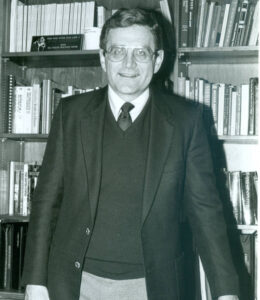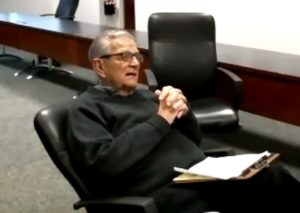
No amount of detail in records can compare to the words of those who lived through that history.
The MCCC Oral History Project gives an opportunity to learn about the history of the college from those who shaped the institution and made it where it is today.
Josh Myers, executive director of the Foundation, said the idea first came about when he was looking through archived photos and the first Board of Trustees meeting minutes with Thomas Adamich, campus librarian and reference technician, and the college’s first president Ron Campbell.
Myers said he and Adamich realized the opportunities they had to hear first-hand accounts of the college through someone like Campbell who helped shape it.
“This was actually a very serendipitous moment,” Myers said.
Myers said he felt they needed to take those stories, look back at the 50-year history, and see where the institution came from.
Adamich applied for the Cultural Enrichment and Endowment Fund and was given $2000 for the project from the Foundation.
Adamich said the main purpose of the MCCC Oral History Program is to develop, establish and operate a framework for preserving the thoughts and perspectives of key individuals who either served at MCCC, were part of the MCCC community, or were members of the Monroe County population who influenced or were greatly impacted in a positive way by MCCC.
Adamich said the interviews originally would be filmed in person through the Monroe Public Access Cable System (MPACT).
Due to COVID-19, the interviews with individuals were held over Zoom instead.
The first of these meetings was with Campbell in January.
“I knew that Dr. Campbell would be an interesting person to work with,” Adamich said. “Being able to talk with him at this point is really a blessing.”
Campbell, 95, became MCCC’s first president in 1964, helping shape the campus and first staff of the college.
Second and third presidents of the college, Jerry Welch and Audrey Warrick, have also talked with Adamich through this project.
“It’s kind of gratifying to see that they’re still engaged and involved with the college,” Adamich said. “That’s kind of a rare thing because you don’t see that continuity over time and we’re talking about 55 plus years.”
He said the most interesting interview was with Jerry Welch.
“He had a lot of interesting ideas and themes about his tenure, and it was nice hearing him talk about his ideas at the time and what he thinks today,” Adamich said.

Adamich said he also interviewed former professor William McCloskey and still-serving adjunct Margie Bacarella.
Bacarella was one of the first students at the college in 1968, has served as an adjunct professor in political science for 39 years, and wrote the second volume of the MCCC history book series.
The book series started with James DeVries’ “Opportunity: The First Twenty Years, Monroe County Community College” covering 1964-1984 and followed with Bacarella’s “Change, Growth, Challenge, Monroe County Community College” documenting 1986-2000.
Myers said the experiences recounted in these interviews correlate with what was written in these books.
“The oral history captures what’s in the book but in a more narrative form and informal setting through the people who have experienced it,” Myers said.
Adamich said the next volume of the history books will cover 2000 to the present.
“It’s time to write that next chapter,” Adamich said. “It’s a good time to capture those stories to see what happens before and what happens next.”
He said interviewing these individuals has been the first phase of the oral history project.
The phases to follow will focus on reaching out to alumni and members of the community.
Those who will be chosen to be interviewed during these phases will depend on their availability and how their themes and experiences relate to those of others who have been interviewed, Adamich said.
“We have really impressive alumni that go on to do amazing things and we want to collect those stories either while they are happening or after and trace them back to MCCC,” Myers said. “Those stories are being made all the time.”
Adamich said he will also reach out to community members impacted by MCCC throughout the years.
There’s so many people in the community that have a story to tell about their time at MCCC that frankly they might not be thinking of until they’re asked the question,” Adamich said.
Once the interviews from each phase are done, Adamich said these recordings will be available to the public in some way.
Myers said he hopes this program will be a continuing project in the college.
“I would love for this to be something that the library takes on as a living initiative not just something that happened in a point of time and went in the dustbin of history and sits in a filing cabinet,” Myers said. “Our history is always evolving, and you never know what’s going to be important.”

